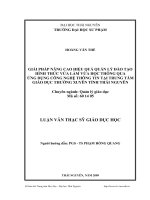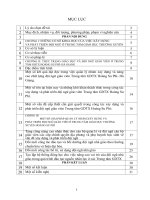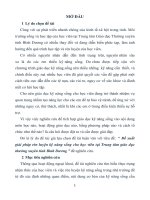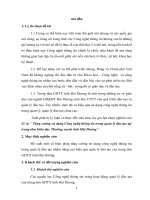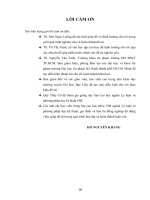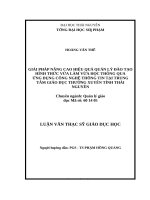SỬ DỤNG HÌNH THỨC ĐỌC CHUYÊN SÂU ĐỂ NÂNG CAO KHẢ NĂNG VIẾT HỌC THUẬT CHO SINH VIÊN CHUYÊN NGÀNH TIẾNG ANH
Bạn đang xem bản rút gọn của tài liệu. Xem và tải ngay bản đầy đủ của tài liệu tại đây (1.02 MB, 11 trang )
<span class='text_page_counter'>(1)</span><div class='page_container' data-page=1>
<b>Tập 183, số 07, 2018</b>
Tập 183
, Số 07
</div>
<span class='text_page_counter'>(2)</span><div class='page_container' data-page=2>
<i> </i>
Tạp chí Khoa học và Công nghệ
CHUYÊN SAN KHOA HỌC XÃ HỘI – NHÂN VĂN – KINH TẾ
Môc lôc
Trang
Hồng Thị Phương Nga - Mơ hình du lịch văn học “Làng Vũ Đại ngày ấy” 3
<i>Phạm Thị Thu Hồi, Trần Thị Thanh - Tiếng lóng trong truyện về đề tài giáo dục của Văn Thành Lê </i>9
Ngô Thị Thanh Nga, Phạm Thị Hồng Vân - Vài nét về các phương thức thể hiện tình vợ chồng trong văn
học trung đại Việt Nam 15
Nguyễn Thị Thắm,Nguyễn Minh Sơn - Ý thức đối thoại của Nguyễn Ngọc Tư với văn học truyền thống thông
<i>qua những nhân vật nữ trong tập truyện Không ai qua sông </i> 21
Đặng Thị Thùy, Nguyễn Diệu Thương - Lơ gích của các hiện tượng “phi lơ gích” trong ca dao, tục ngữ
người Việt 27
Đinh Thị Giang - Những nhân tố ảnh hưởng đến lối sống của người Việt ở đồng bằng Bắc Bộ hiện nay 33
Nguyễn Diệu Thương, Nguyễn Thị Lan Hương - Phương thức tạo hàm ý trong tiểu phẩm trào phúng 39
<i>Nguyễn Thu Quỳnh, Vì Thị Hiền - Từ ngữ chỉ đồ gia dụng trong tiếng Thái ở tỉnh Điện Biên </i> 45
Nguyễn Thị Thu Oanh, Hoàng Thị Mỹ Hạnh - Vị thế, vai trò cầm quyền của Đảng Cộng Sản Việt Nam giai
đoạn 1945 - 1975 và một số bài học kinh nghiệm 51
Đỗ Hằng Nga, Phạm Quốc Tuấn - Việc thu thuế trong làng xã qua tư liệu hương ước cải lương tỉnh Thái Nguyên 57
Lê Văn Hiếu - Hiệu quả hoạt động của mô hình “ban tuyên vận” xã, phường, thị trấn và “tổ tuyên vận” thôn, bản, tổ
dân phố ở tỉnh Lào Cai trong giai đoạn hiện nay 63
Thái Hữu Linh, Nguyễn Thị Thu Hiền, Nguyễn Thị Thanh Hà - Vai trò của hậu phương Bắc Thái trong cuộc
tổng tiến công Mậu Thân năm 1968 69
Phạm Anh Nguyên - Sức hấp dẫn trong Hài đàm của Phan Khôi 73
Nguyễn Thị Hường, Nguyễn Thị Mão, Nguyễn Tuấn Anh - Nâng cao hiệu quả tổ chức các hoạt động ngoại
khoá trong dạy học môn giáo dục công dân ở các trường trung học phổ thông trên địa bàn thành phố Thái
Nguyên hiện nay 79
Nguyễn Văn Dũng, Đào Ngọc Anh - Thực trạng thể chất của sinh viên không chuyên thể dục thể thao Trường
Đại hoc Sư phạm – Đại học Thái Nguyên 85
Trần Bảo Ngọc, Lê Ngọc Uyển, Bùi Thanh Thủy và cs - Thực trạng xếp loại tốt nghiệp sinh viên diện cử
tuyển ở trường Đại học Y Dược – Đại học Thái Nguyên giai đoạn 2013-2017 91
Nguyễn Thúc Cảnh - Nghiên cứu xây dựng hệ thống bài tập có nội dung thực tế trong giảng dạy cơ học cho
học sinh trung học phổ thông 97
Hà Thị Kim Linh, Chu Thị Bích Huệ - Giáo dục kiến thức pháp luật cho phụ nữ vùng dân tộc thiểu số ở huyện
Võ Nhai, tỉnh Thái Nguyên 105
Nguyễn Thị Thanh Hồng, Nguyễn Thị Khánh Ly, Vũ Kiều Hạnh - Tăng cường sự tham gia của sinh viên
vào các hoạt động học tiếng Anh trong lớp học đơng nhiều trình độ của sinh viên năm thứ nhất trường Đại học
Y Dược – Đại học Thái Nguyên 111
Phạm Thị Huyền, Vũ Thị Thủy - Vận dụng phong cách nêu gương theo tư tưởng Hồ Chí Minh trong xây dựng
phong cách làm việc đối với cán bộ chủ chốt ở nước ta hiện nay 117
Đàm Quang Hưng - Thiết kế bài học khoa học lớp 4, lớp 5 theo hướng tìm tịi thực nghiệm 123
Hồng Thị Thu Hồi - Những khó khăn trong việc dạy và học từ vựng tiếng Anh chuyên cho sinh viên chuyên
ngành điều dưỡng, trường Cao đẳng Y tế Thái Nguyên và một số giải pháp đề xuất 129
Journal of Science and Technology
183
(07)
</div>
<span class='text_page_counter'>(3)</span><div class='page_container' data-page=3>
Nguyễn Lan Hương, Văn Thị Quỳnh Hoa - Những nhân tố ảnh hưởng đến khả năng nói tiếng Anh của sinh
viên năm thứ nhất trường Đại học Nông Lâm – Đại học Thái Nguyên 135
Vũ Kiều Hạnh - Những yếu tố quyết định đến mức độ đọc hiểu của sinh viên năm thứ hai tại trường Đại học
Nông Lâm – Đại học Thái Nguyên 141
Nguyễn Thị Quế, Hoàng Thị Nhung - Hỏi đúng để tự học và học tập cộng tác thành công – hướng tới xây
dựng người học ngoại ngữ độc lập trong bối cảnh hội nhập khu vực và quốc tế 147
Ngô Thị Thu Hà, Nguyễn Thị Hoài Thu - Ứng dụng các phương pháp giảng dạy tích cực nhằm nâng cao chất
lượng dạy – học tiếng Việt cho học viên quốc tế tại Học viện Kỹ thuật Quân sự 153
Dương Văn Tân - Đánh giá hiệu quả áp dụng trò chơi vận động trong phát triển thể lực chung cho sinh viên
trường Đại học Kỹ thuật Công nghiệp – Đại học Thái Nguyên 159
Bùi Thị Hương Giang - Nâng cao năng lực giao tiếp giao văn hóa trong dạy và học ngoại ngữ 165
Trần Hồng Tinh, Nơng La Duy, Phạm Văn Tn - Xây dựng trung đội tự quản trong quản lý giáo dục tính
kỷ luật cho sinh viên tại trung tâm giáo dục quốc phòng và an ninh trong giai đoạn hiện nay 171
Trần Thị Yến, Khổng Thị Thanh Huyền - Sử dụng hình thức đọc chuyên sâu để nâng cao khả năng viết học
thuật cho sinh viên chuyên ngành tiếng Anh 177
Đỗ Thị Hồng Hạnh, Hoàng Mai Phương - Đào tạo nghề cho lao động nông thôn trên địa bàn huyện Chợ Mới,
tỉnh Bắc Kạn 183
Trần Thùy Linh, Trần Lương Đức, Nguyễn Thị Thùy Trang - Cách tiếp cận của pháp luật cạnh tranh liên
minh châu Âu về hành vi lạm dụng mang tính trục lợi 189
Nguyễn Thị Thanh Hà, Phạm Việt Hương - Xây dựng bộ tiêu chí và chỉ số kinh tế phù hợp để đánh giá quản
lý rừng bền vững ở huyện Định Hóa 195
Đinh Thị Hồi - Truyền thơng marketing sản phẩm và dịch vụ thông tin - thư viện tại Trung tâm Học liệu Đại
học Thái Nguyên 201
Nguyễn Thị Thanh Xuân - Nghiên cứu nhân tố ảnh hưởng đến sự hài lòng của khách hàng sử dụng dịch vụ
khách sạn tại Thanh Hóa, Việt Nam 207
Dương Thị Tình - Đóng góp của xuất khẩu hàng hóa tới tăng trưởng kinh tế của tỉnh Yên Bái 213
Lê Minh Hải, Trần Viết Khanh - Phân tích tổ chức khơng gian lãnh thổ du lịch tỉnh Thái Nguyên 219
Hà Văn Vương - Vận dụng lý thuyết Ecgônômi trong tổ chức mơi trường làm việc tại văn phịng chi nhánh may
Sông Công II - Công ty Cổ phần Đầu tư và Thương mại TNG 227
Mai Anh Linh, Nguyễn Thị Minh Anh - Đánh giá chất lượng dịch vụ và sự hài lòng của khách hàng: nghiên
cứu thực nghiệm tại siêu thị Lan Chi, Thái Nguyên 233
Đinh Hồng Linh, Nguyễn Thu Nga, Nguyễn Thu Hằng - Sử dụng hàm Loga siêu việt để đánh giá hiệu quả
</div>
<span class='text_page_counter'>(4)</span><div class='page_container' data-page=4>
<i> Trần Thị Yến và Đtg </i> Tạp chí KHOA HỌC & CƠNG NGHỆ 183(07): 177 - 182
177
IMPROVING ACADEMIC WRITING PERFORMANCE
FOR ENGLISH MAJORS THROUGH INTENSIVE READING
Tran Thi Yen*, Khong Thi Thanh Huyen
<i>TNU - University of Education </i>
SUMMARY
At tertiary level, academic writing has always been more crucial for English majors. Therefore,
students need appropriate guidance to develop their writing ability. Indeed, making connections
between intensive reading and academic writing is an effective way to enhance language
proficiency since reading is input and writing is output. In addition, combining intensive reading-
academic writing provides students with opportunities to think logically, organize their thoughts
and share their knowledge. As can be seen from the results of some academic writing tests at Thai
Nguyen University of Education, a large number of teachers complain about English majors’
incapability to organize their ideas logically, their lack of appropriate information to cover topics,
their limited vocabulary, their structure and spelling mistakes, and their writing patterns.
Furthermore, English majors of TUE also complain about being unable to write professionally -
the students cannot express cogently in English while doing any academic writing. As a result, the
ultimate objective of the study is to investigate the impacts of intensive reading on the students’
writing performance. The focus of the investigation is on the influence of the amount of language
input provided for students on their academic writing performance. Moreover, this study has an
intention to figure out how to exploit intensive reading effectively with a view to enhancing
students’ academic writing performance.
<i>Keywords: intensive reading; academic writing performance; English majors; language input; </i>
<i>writing skill </i>
INTRODUCTION *
In intensive reading, students read texts which
are more complicated with regard to content
and language than those utilized for extensive
reading. According to Macalister (2011) [1],
instructors should concentrate on reading
skills such as guessing the meaning of words
or phrases and figuring out the main idea.
This helps students to understand the meaning
of the whole text. In sum, Macalister (2011)
[1] assumes that there are four learning
objectives of intensive reading. They are: (i)
concentrating on new language like
vocabulary and grammar; (ii) concentrating
on ideas such as topics and themes; (iii)
improving new sub-skills such as making
inferences and finding out main ideas; (iv)
and taking notice of text features such as
genre structure, cohesion and coherence.
In previous centuries, reading was the
primary concentration rather than writing. For
instance, in the eighteenth and the nineteenth
*
<i>Tel: 0979 697 224; Email: </i>
</div>
<span class='text_page_counter'>(5)</span><div class='page_container' data-page=5>
<i> Trần Thị Yến và Đtg </i> Tạp chí KHOA HỌC & CƠNG NGHỆ 183(07): 177 - 182
178
Stotsky (1983) [5] believes that there is a
close correlation between reading and writing.
He points out the following ideas:
There is a connection between reading
attainment and writing performance. In fact,
better writers tend to become better readers.
There is a connection between writing
performance and reading experience. Actually,
better writers read more than poor writers.
There is a connection between reading
competency and measure of syntactic
complication in writing. Indeed, better readers
produce more syntactically nature writing
than poor readers.
AIMS OF THE RESEARCH
This research aims to develop students’
academic writing performance through
intensive reading. The focus of the
investigation is on the influence of the amount
of language input provided for students on
their academic writing performance.
Furthermore, this study has an intention to
figure out how to exploit intensive reading
effectively with a view to enhance students’
academic writing performance.
METHODOLOGY
The research has been conducted based on
mixed methods because it combines
experimental method, qualitative method
(observation checklists) and quantitative
method (questionnaires and T-tests).
The participants of this study are 20
second-year English majors at Thai Nguyen
University of Education, who were selected at
random, and then based on the pre-test, put
into 2 groups: experimental group and control
group on a condition that the both groups’
level of English proficiency is balance.
Another group of participants are 5 English
teachers of writing chosen purposively to
complete the questionnaire.
Regarding the procedure for collecting data,
firstly, all the 20 selected students were
required to do a pre-test in the format of
IELTS Writing Task 2 with the aim to inform
the researcher about the problems in learners’
academic writing and their strengths in
academic writing to design lesson plans
appropriately and to put students into the
experimental group and the control group.
Pre-questionnaires were delivered to both
teachers and students to investigate their
experience, difficulties, methods, techniques,
opinions related to academic writing; all of this
information helps the researcher design
effective lesson plans for the experimental class.
Then, the researcher carried out experimental
teaching with 2 groups: experimental group
(studying with intensive reading) and control
group (studying without intensive reading).
Five lessons associated with different topics
were delivered to the two groups. During the
lessons, classroom observation was conducted
by the teacher for more authentic information.
The observation checklist was utilized to
observe the learning processes and to take a
record of the classroom activities during the
implementation of the actions. It consisted of
the way the teacher conducted their lesson,
how students’ attitude was in the class, what
interaction students were during the lessons
and what atmosphere there was in the class.
After each lesson, the researcher collected
and evaluated students’ writing paper as a
post-test in order to figure out how much their
progress is and find out the differences
between the two group’ results.
Finally, a post-questionnaire was delivered to
the experimental group to collect data regarding
learners’ experience of academic writing, their
attitude to academic writing through using
intensive reading and their suggestions to
improve the effectiveness of using intensive
reading in writing performance.
All of the data collected were coded, analyzed
and compared between the experimental
group and the control group.
FINDINGS AND DISCUSSIONS
Students’ pre-test scores in the experimental
and control group
</div>
<span class='text_page_counter'>(6)</span><div class='page_container' data-page=6>
<i> Trần Thị Yến và Đtg </i> Tạp chí KHOA HỌC & CÔNG NGHỆ 183(07): 177 - 182
179
group is 5.65 and 5.6 respectively. In other
words, both groups’ level of writing
proficiency is almost similar.
<i>Table 1. The average band score in the pre-test of </i>
<i>the experimental and control group </i>
The
experimental
group
The
control
group
Total number
of participants 10 10
Total number
of band scores 56.5 56
The average
band score 5.65 5.6
Students’ post-test scores in the experimental
and control group
<i>Table 2. The average band score in the post-test </i>
<i>of the experimental and control group </i>
Experimental
group
Control
group
Post-test 1 6.20 5.75
Post-test 2 6.55 5.85
Post-test 3 6.60 5.90
Post-test 4 6.70 5.85
Post-test 5 6.85 5.80
The average
band score 6.58 5.83
Table 2 shows the accurate band score by an
average student of both groups. For a deeper
analysis, the researcher calculates the accurate
band score by an average student by dividing
the total number of band scores by 6- the
number of writing papers. Generally, the
average band score of the experimental group
in the post-test is 6.58. However, the average
band score of the traditional group is only
5.83 although both groups’ level of
proficiency before the experiment is quite
similar. To put it another way, the average
band score in the control group is lower than
that of experimental group. This proves that
intensive reading has a positive effect on
learners’ writing performance.
The learning outcome of each participant
in the experimental and control groups
It is visible in table 3 and 4 that all of the
students made a gradual improvement in
academic writing. It is noticeable that there is
a big difference between pre-test scores and
post-test scores of the participants in the
experimental group while there is an
insignificant gap between pre-test scores and
post-test scores of the 10 students in the
control group. This demonstrates that
although the experiment was implemented in
only three weeks, the participants’ academic
writing competence is improved when
learning intensive reading. In the traditional
classroom group, the improvement in writing
performance is unremarkable.
<i>Table 3. The learning outcome of each participant </i>
<i>in the experimental group </i>
Par
ticipan
t
Pre-test Post-test
1
Post-test
2
Post-test
3
Post-test
4
Post-test
5
Averag
e
1 6 7 7 7.5 7 7.5 <sub>7.00 </sub>
2 <sub>5.5 </sub> <sub>5.5 </sub> <sub>6 </sub> <sub>6 </sub> <sub>6.5 </sub> <sub>6 </sub> <sub>5.92 </sub>
3 7 7.5 7.5 7.5 7.5 8 7.50
4 5 6 6 6 6 6.5 5.92
5 <sub>4.5 </sub> <sub>5 </sub> <sub>6 </sub> <sub>6 </sub> <sub>6.5 </sub> <sub>7 </sub> <sub>5.83 </sub>
6 <sub>4 </sub> <sub>5.5 </sub> <sub>6 </sub> <sub>6 </sub> <sub>6 </sub> <sub>6 </sub> <sub>5.58 </sub>
7 6.5 7 7 7.5 7 7.5 7.08
8 5.5 5.5 6 6 6.5 6 <sub>5.92 </sub>
9 <sub>6 </sub> <sub>6.5 </sub> <sub>7 </sub> <sub>6.5 </sub> <sub>7 </sub> <sub>7 </sub> <sub>6.67 </sub>
10 6.5 6.5 7 7 7 7 6.83
<i>Table 4. The learning outcome of each participant </i>
<i>in the control group </i>
Par
ticipan
t
Pre-test Post-test
1
Post-test
2
Post-test
3
Post-test
4
Post-test
5
Averag
e
1 6 6.5 6.5 6.5 6.5 6.5 6.4
2 5.5 5.5 6 5.5 5.5 5.5 5.6
3 6.5 6.5 6.5 6.5 6.5 6.5 6.5
4 5 5 5 6 5 5 5.2
5 4 4.5 4.5 4.5 4.5 4.5 4.4
6 4 4 4 4 4.5 4.5 4.2
</div>
<span class='text_page_counter'>(7)</span><div class='page_container' data-page=7>
<i> Trần Thị Yến và Đtg </i> Tạp chí KHOA HỌC & CÔNG NGHỆ 183(07): 177 - 182
180
Students’ preference of using intensive
reading in academic writing
<i>Data from the post-questionnaire </i>
In the post-questionnaire, the researchers
asked students in the experimental group
about their attitude towards using intensive
reading before writing an academic essay. All
of the participants stated that they find it easy
to do any academic writing through intensive
reading. They can get ideas, vocabulary and
structures from the reading text to apply in
their writing papers. Besides, 100% of the
participants claimed that they appreciate this
method and they are totally excited about it
because intensive reading helps students
enhance writing competency.
Most of the students in the experimental
group (80%) also hoped that their teacher
would utilize intensive reading to teach them
academic writing at school regularly.
<i>Data from the classroom observation checklist </i>
Based on the researcher’ observation recorded
in the checklist, students of the experimental
class had positive reactions in the class:
listening to the instructions, understanding
directions, working independently and
understanding the concepts represented.
Similar to the experimental group, students in
the traditional group also had a positive
attitude. For example, they listened to the
teacher, understood directions, worked
independently and understood the concepts
given. Nevertheless, they were usually
distracted and sometime talked in class. In
terms of interaction during the lessons,
students in the experimental were cooperative
with teachers as they followed the teacher’s
instructions. Furthermore, students were more
excited to join in group work and discussed
the topic of the lesson. As a result, they
interacted well with each other in the process
of discussion. On the contrary, several
students in the traditional class usually
avoided working in pairs or in groups.
Moreover, they were sometimes not excited
to answer the teacher’s questions. With regard
to the atmosphere in the class, students were
happy and interested in the lesson. This is the
reason why students in the experimental
group were enthusiastic to participate in
pair-work or group-pair-work as well as raised their
hands to answer the teacher’s questions.
Unlike the experimental group, some students
in the traditional group looked bored with
yawns in all of the 5 lessons, but a few of
them were still excited because they have
already learnt the subject matter in the same
way before.
In conclusion, by analyzing the questionnaire
responses gathered and the researchers’
observation recorded in the checklist, the
researchers realize that the new method
stimulates students’ interest and desire to
learn academic writing.
Advantages of intensive reading in
academic writing identified by teachers
and students
<i>Table 5. Advantages of using intensive reading in </i>
<i>academic writing </i>
Advantage Teacher
%
Student
%
It will be easier for learners
to get ideas
100% 100%
It helps students focus on
grammatical form and
understand literal meaning,
implication, rhetorical and
the like
60% 80%
It will be easier for learners
to extend knowledge of
vocabulary and idioms
100% 100%
Learners will learn how to
express in the text
80% 60%
Learners will be motivated
in academic writing
60% 60%
</div>
<span class='text_page_counter'>(8)</span><div class='page_container' data-page=8>
<i> Trần Thị Yến và Đtg </i> Tạp chí KHOA HỌC & CƠNG NGHỆ 183(07): 177 - 182
181
Teachers’ and students’ suggestions for
enhancing the effectiveness of using
intensive reading in academic writing
<i>Table 6. Suggestions for enhancing the effectiveness </i>
<i>of intensive reading in academic writing </i>
Suggestion Teacher
%
Student
%
Teachers should plan
lessons by choosing which
abilities, core content and
knowledge requirements in
accordance with the
curriculum.
100% 80%
Teachers should give
students examples from
each genre to create a
pre-understanding among
students.
60% 80%
Some kinds of formative
assessment should be
made.
100% 30%
From the perspectives of both teachers and
students, the primary solution to improve the
effectiveness of using intensive reading in
academic writing is that teachers should plan
lessons by choosing which abilities, core
content and knowledge requirements in
accordance with the curriculum. An
additional solution of this problem is that
teachers should give students examples from
each genre to create a pre-understanding
among students. While all of the teachers
claimed that some kind of formative
assessment by teachers and students should be
made, only a few students agree this solution.
RECOMMENDATIONS FOR TEACHERS
IN TEACHING ACADEMIC WRITING
The results from the questionnaires, writing
tests and observation checklists manifest
significant benefits of using intensive reading;
however, some shortcomings were also noticed.
Below are some recommendations for teachers
to improve the quality of using intensive
reading to teach academic writing in class.
Teachers should provide students with
informative and motivating reading texts
The reading text should be not only
informative but also challenging and exciting
enough to motivate students to read and make
the best use of the text in their writing.
Teachers should provide their English majors
with a full account of intensive reading
Teachers should give a full knowledge of the
reading text before asking students to practice
writing an essay on a particular topic like
ideas, vocabulary, useful expressions or
format of each type of academic writing.
Furthermore, teachers ought to make use of
the reading materials and activities which will
arouse learners’ motivation and develop their
writing skill.
Teachers should encourage students to find
the reading text themselves and share with
their peers
Besides the reading texts provided by the
teachers, students themselves can find reading
resources and share them with their
classmates. By doing so, students can
accumulate a variety of reading texts on
various topics. They may also become more
independent and active in learning.
Encourage more practice
Another important recommendation is that
students should be encouraged to practice
reading and writing more in class and at home,
individually, in pairs and in groups. In this
way, both their reading skills, vocabulary,
grammar and writing skills will be improved
on a daily basis.
CONCLUSION
Overall, it is necessary to have an overview
about the use of intensive reading to facilitate
the teaching and learning of English academic
writing. The results collected by
questionnaires, T-tests and observation
checklists can be summarized as follows:
Firstly, there is a big difference between
pre-test score and post-pre-test score of the
participants in the experimental group while
there is an insignificant gap between pre-test
score and post-test scores of the students in
the traditional group. This demonstrates that
</div>
<span class='text_page_counter'>(9)</span><div class='page_container' data-page=9>
<i> Trần Thị Yến và Đtg </i> Tạp chí KHOA HỌC & CÔNG NGHỆ 183(07): 177 - 182
182
competence is improved better when learning
intensive reading compared with the
traditional group.
Secondly, teachers’ perspectives are
consistent with students’ perspectives on
aspects of the problems such as the
difficulties, the techniques applied in
academic writing, the advantages and
disadvantages of using intensive reading in
writing, and suggestions to improve the
effectiveness of utilizing intensive reading in
academic writing.
Finally, by analyzing students’ questionnaire
responses and observing the classroom, the
researcher realizes that the new method
stimulates students’ interest and desire to
learn academic writing.
Hopefully, our study might be helpful for
students and teachers to develop academic
writing’ performance.
REFERENCES
1. Macalister, J. (2011), “Today’s teaching,
tomorrow’s text: Exploring the teaching of
<i>reading”, ELT Journal, 65(2), pp.161-169. </i>
2. Tribble, C. (1996), Writing, Oxford: Oxford
University Press.
<i>3. Johnson, A. P. (2008), Teaching Reading and </i>
<i>Writing: A </i> <i>Guidebook for </i> <i>Tutoring </i> <i>and </i>
<i>Remediating </i> <i>Students, </i> USA: Rowman &
Littlefield Education.
4. Eisterhold, J. (1991), “Reading–writing
connections: Toward a description for second
<i>language learners”, In B. Kroll (Ed.), Second </i>
<i>language writing: Research insights for the </i>
<i>classroom (pp. 88–101), Cambridge: Cambridge </i>
University Press.
5. Stotsky, S. (1983), “Research on
Reading/Writing Relationships: A Synthesis and
<i>Suggested Directions”, Language Arts, 60(5), pp. </i>
627-642.
TÓM TẮT
SỬ DỤNG HÌNH THỨC ĐỌC CHUYÊN SÂU ĐỂ NÂNG CAO KHẢ NĂNG
VIẾT HỌC THUẬT CHO SINH VIÊN CHUYÊN NGÀNH TIẾNG ANH
Trần Thị Yến*, Khổng Thị Thanh Huyền
<i>Trường Đại học Sư phạm – ĐH Thái Nguyên </i>
Ở bậc đại học, viết học thuật rất quan trọng đối với sinh viên chuyên ngành tiếng Anh. Vì vậy,
sinh viên cần có sự hướng dẫn thích hợp để phát triển khả năng viết của mình. Quả thật, việc kết
nối giữa hình thức đọc chuyên sâu và viết học thuật là một cách hiệu quả để nâng cao mức độ sử
dụng thành thạo ngơn ngữ vì đọc là để tích lũy kiến thức và viết là để sản sinh ra kiến thức. Ngoài
ra, việc kết hợp giữa hình thức đọc hiểu chuyên sâu và viết học thuật cung cấp cho sinh viên cơ hội
tư duy lơ-gíc, sắp xếp các ý tưởng và chia sẻ kiến thức của mình. Kết quả khảo sát ý kiến và đánh
giá một số bài kiểm tra kỹ năng viết tiếng Anh học thuật tại trường Đại học Sư phạm - ĐH Thái
Nguyên cho thấy nhiều sinh viên chuyên ngữ không thể sắp xếp ý tưởng một cách hợp lý, thiếu
thông tin phù hợp để viết về các chủ đề, thiếu từ vựng, cấu trúc và mắc nhiều lỗi chính tả, ngữ
pháp cũng như diễn đạt. Vì vậy, mục đích của nghiên cứu là để điều tra những ảnh hưởng của hình
thức đọc chuyên sâu đến khả năng viết học thuật của sinh viên chuyên ngữ. Trọng tâm của cuộc
điều tra là xem xét mức độ ảnh hưởng của đầu vào ngôn ngữ được cung cấp cho sinh viên thơng
qua hình thức đọc chuyên sâu để nâng cao khả năng viết học thuật. Ngồi ra, nghiên cứu cịn tìm
hiểu cách khai thác hiệu quả hình thức đọc chuyên sâu nhằm nâng cao khả năng viết học thuật cho
sinh viên chuyên ngành tiếng Anh.
<i>Từ khóa: đọc chuyên sâu; khả năng viết học thuật; sinh viên chuyên ngữ; đầu vào ngôn ngữ; kĩ </i>
<i>năng viết </i>
<i>Ngày nhận bài: 20/5/2018; Ngày phản biện: 05/6/2018; Ngày duyệt đăng: 29/6/2018</i>
*
</div>
<span class='text_page_counter'>(10)</span><div class='page_container' data-page=10>
<i>oµ </i>
<i>soT</i>
T¹p chÝ Khoa häc và Công nghệ
SOCIAL SCIENCE – HUMANITIES – ECONOMICS
Content
PageHoang Thi Phuong Nga - Literature tourism model “the old Vu Dai village” 3
<i>Pham Thi Thu Hoai, Tran Thi Thanh - Slang in Van Thanh Le's stories about education problems </i>9
Ngo Thi Thanh Nga, Pham Thi Hong Van - A brief description of the modes of expressing conjugal
sentiments in the Vietnam medieval literature 15
Nguyen Thi Tham, Nguyen Minh Son - The opposite view of Nguyen Ngoc Tu to Vietnamese traditional
<i>literature via the main female characters in Khong ai qua song </i> 21
Dang Thi Thuy, Nguyen Dieu Thuong - The logic of “non logic” phenomenon in Vietnamese folk verses, proverbs 27
Dinh Thi Giang - Factors affecting current lifestyle of Vietnamese people in the northern delta 33
Nguyen Dieu Thuong, Nguyen Thi Lan Huong - Mechanisms creating implication in satirical jokes 39
Nguyen Thu Quynh, Vi Thi Hien - Household vocabulary of Thai language in Dien Bien province 45
Nguyen Thi Thu Oanh, Hoang Thi My Hanh - Position, role of the communist party of Vietnam in the period
1954 – 1975 and some lessons learned 51
Do Hang Nga, Pham Quoc Tuan - Collection of taxes in the villages through material of reformist village
convention in Thai Nguyen province 57
Le Van Hieu - The efficiency of the model "propaganda department" in communes, wards, township and
"commander" in villages, cities at the current period in Lao Cai province 63
Thai Huu Linh, Nguyen Thi Thu Hien, Nguyen Thi Thanh Ha - The role of the rear Bac Thai in the 1968
general offensive 69
Pham Anh Nguyen - The attraction in “Hai dam” of Phan Khoi 73
Nguyen Thi Huong, Nguyen Thi Mao, Nguyen Tuan Anh - Enhancing the efficiency of extracurrucular
activities in teaching civic education at high schools in thai nguyen city these days 79
Nguyen Van Dung, Dao Ngoc Anh - Physical status of non-sports students at Thai Nguyen University of Education 85
Tran Bao Ngoc, Le Ngoc Uyen, Bui Thanh Thuy et al - The reality of degree classification in
non-examination students at University of Medicine and Pharmacy – Thai Nguyen University in the period from
2013 to 2017 91
Nguyen Thuc Canh - The need for buiding an exercise system with practical content to teach mechanics
to high school 97
Ha Thi Kim Linh, Chu Thi Bich Hue - Educate legal knowledge for ethnic minority women in Vo Nhai
district, Thai Nguyen province 105
Nguyen Thi Thanh Hong, Nguyen Thi Khanh Ly, Vu Kieu Hanh - Improve students’ participation in
English learning activities in large mixed ability classes of the freshman students at Thai Nguyen University of
<i>Medicine and Pharmacy </i> 111
Pham Thi Huyen, Vu Thi Thuy - Manipulate exemplary style according to the President Ho Chi Minh’s
thought in building work style for key caders at present period 117
Dam Quang Hung - Science lesson planning for grade 4, 5 according to experimental research 123
Hoang Thi Thu Hoai - Difficulties in teaching and learning ESP vocabulary for nursing students at Thai
Nguyen Medical College and some solutions 129
Nguyen Lan Huong, Van Thi Quynh Hoa - Determinants affecting English speaking performance of the
<i>first-year students at Thai Nguyen University of Agriculture and Forestry </i> 135
Journal of Science and Technology
183
(07)
</div>
<span class='text_page_counter'>(11)</span><div class='page_container' data-page=11>
Vu Kieu Hanh - Determinants to the reading comprehension performance level of the second- year students at
Thai Nguyen University of Agriculture and Forestry 141
Nguyen Thi Que, Hoang Thi Nhung - Asking the right question for successful self-studying and cooperative
learning - towards independent language learners in the context of ASEAN community and global integration 147
Ngo Thi Thu Ha, Nguyen Thi Hoai Thu - Apply interactive teaching methods to improve the quality of
teaching and learning Vietnamese to international students at Military Technical Academy 153
Duong Van Tan - An assessment of the effectiveness in application of games in general physical development
for students at Thai Nguyen University of Technology 159
Bui Thi Huong Giang - Improving intercultural communicative competence in foreign language teaching
<i>and learning </i> 165
Tran Hoang Tinh, Nong La Duy, Pham Van Tuan - Building self-managed platoon in disciplinary education
for students at the center for defense and security education in the current phase 171
Tran Thi Yen, Khong Thi Thanh Huyen - Improving academic writing performance for english majors
through intensive reading 177
Do Thi Hong Hanh, Hoang Mai Phuong - Vocational training for rural workers in Cho Moi district, Bac
Kan province 183
Tran Thuy Linh, Tran Luong Duc, Nguyen Thi Thuy Trang - European union competition law approach on
exploitative abuses 189
Nguyen Thi Thanh Ha, Pham Viet Huong - Setting up an appropriate set of economic criteria and indicators
for evaluating sustainable forest management in Dinh Hoa district 195
Dinh Thi Hoai - Marketing promotion for information - library product and service at the Learning Resource
Center of Thai Nguyen University 201
Nguyen Thi Thanh Xuan - Factors affecting customer satisfaction in hotels at Thanh Hoa province, Vietnam 207
Duong Thi Tinh - Contributions of goods export to the economic growth of Yen Bai province 213
Le Minh Hai, Tran Viet Khanh - Tourism space organization of Thai Nguyen province 219
Ha Van Vuong - Apply the ergonomics theory in working environment organization at the office of Song Cong
grarment branch II – TNG Investment and Trading Joint Stock Company 227
Mai Anh Linh, Nguyen Thi Minh Anh - Assessing service quality and customer satisfaction: an empirical
study at Lan Chi supermarket, Thai Nguyen city 233
Dinh Hong Linh, Nguyen Thu Nga, Nguyen Thu Hang - Applying logarithmic function to evaluate the
business efficiency of Vietnam banks 239
</div>
<!--links-->
